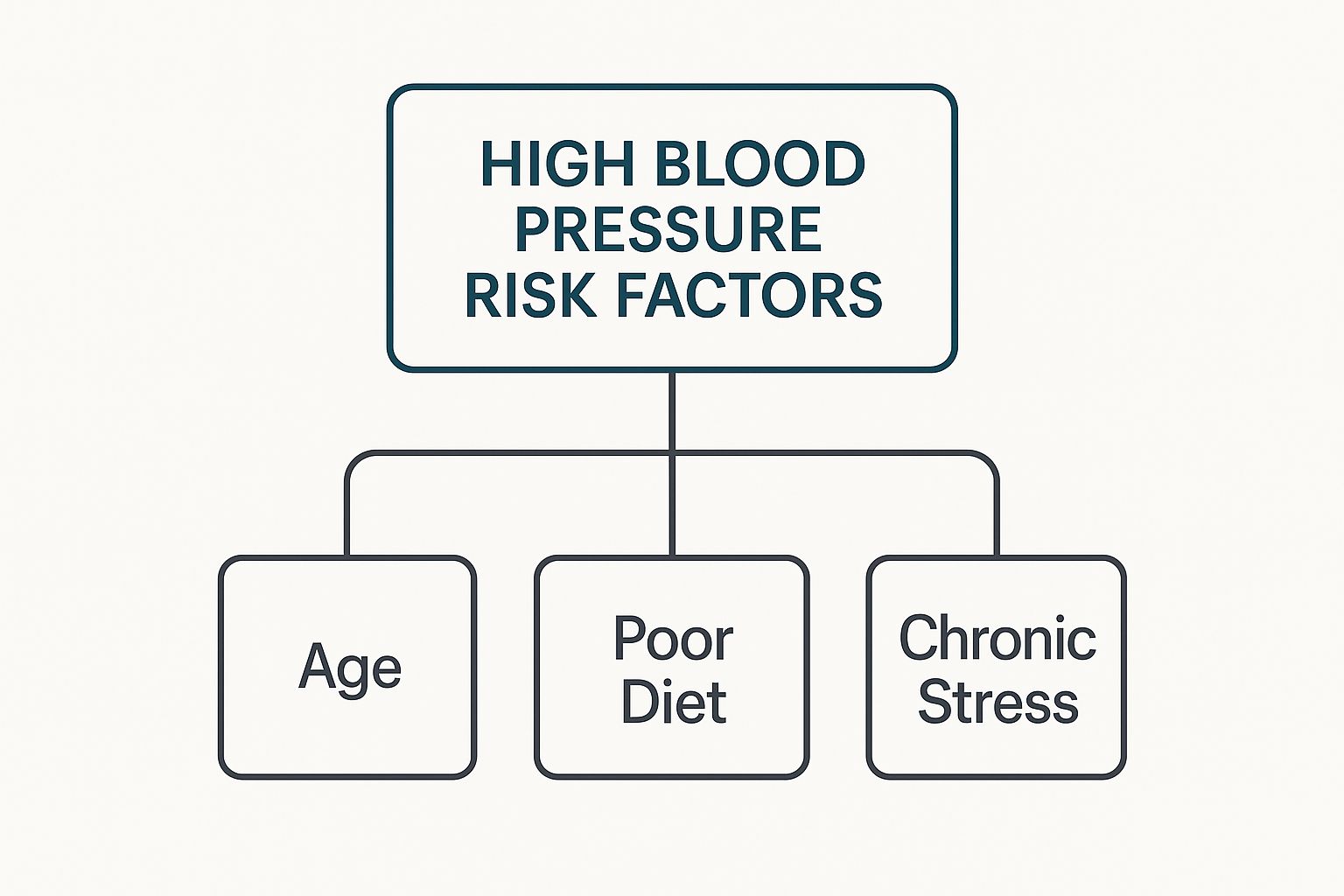.webp)
It’s a frightening thought, but high blood pressure symptoms are often completely absent until the condition becomes severe. This is precisely why it’s earned the grim nickname, the "silent killer."
For most people, there are no early warning signs at all. The only way to know for certain if you have high blood pressure is through regular checks. Waiting for symptoms to appear is a dangerous gamble you just can’t afford to take with your health.
We tend to assume that a serious medical issue would announce itself with clear warning signs—a nagging ache, a sharp pain, or just a general feeling that something is off. High blood pressure, however, quietly defies this logic, which is exactly what makes it so treacherous. It rarely causes any noticeable symptoms in its early or even moderate stages.
Think of your circulatory system like the plumbing in your house. Your blood pressure reading gives you two numbers: systolic (the top number) measures the pressure when your heart beats, and diastolic (the bottom number) measures the pressure when your heart rests between beats.
When this pressure is consistently too high, it’s like running water through your pipes at a dangerously high force, day in and day out. You wouldn't necessarily see or hear the immediate strain, but over time, that constant force silently weakens the pipes, causing hidden damage that could lead to a catastrophic burst. This is a perfect analogy for how hypertension operates inside your body.
This silent nature has fuelled a major health crisis here in the United Kingdom. It’s estimated that more than 40% of adults have either undiagnosed or uncontrolled high blood pressure.
That translates to over 4.2 million people unknowingly living with a condition that dramatically increases their risk of a serious, life-altering health event. You can learn more about the UK hypertension crisis on wecovr.com.
Just because there are no symptoms doesn't mean no harm is being done. Every single day that high blood pressure goes unmanaged, it puts relentless strain on your most vital organs.
The real danger of hypertension isn't a sudden, dramatic symptom, but the slow, cumulative damage it inflicts on your heart, brain, kidneys, and eyes over months and years without you ever feeling it.
This slow-burn damage can eventually lead to severe complications. For many, the first "symptom" they experience isn't a headache or dizziness, but a life-changing event like a heart attack or a stroke. In fact, prolonged hypertension is a leading contributor to serious conditions like heart failure, where the heart muscle simply becomes too weak to pump blood effectively around the body.
Because you can’t feel high blood pressure, proactive monitoring is your only reliable defence. The first crucial step is understanding that "feeling fine" is not a reliable indicator of healthy blood pressure. At The Vesey, we focus on preventive care, helping you understand your numbers and manage this hidden threat before it causes irreversible damage.
While chronic high blood pressure often works silently in the background, a sudden and dangerous spike can set off noticeable, often alarming, symptoms. It’s vital to understand that these aren't signs of everyday hypertension. They are emergency signals, telling you that your body is under extreme cardiovascular distress.
Simply waiting for these warnings to appear is not a safe health strategy. But knowing how to recognise them could save a life.

Think of it like the oil pressure light in your car. You don’t get a warning for slightly low oil. But if the pressure suddenly drops to a critical level, a bright red light flashes on your dashboard, demanding immediate attention. These symptoms of high blood pressure are your body's red alert.
One of the most frequently reported signs of dangerously high blood pressure is a severe, pounding headache. This isn't your typical tension headache after a long day at the office. It's often described as a throbbing pain that feels different and far more intense than usual.
This happens when blood pressure soars high enough to put significant pressure on the delicate blood vessels in and around the brain—a situation we call a hypertensive crisis. This intense pressure can cause swelling or even leakage from these vessels, triggering a severe pain response. If you're hit with an unusually severe headache, it's crucial to get it checked out. You can find more information about when to be concerned about headaches in our detailed guide.
When your heart is forced to pump against extremely high resistance in your arteries, it can struggle to get enough oxygenated blood to the rest of your body, including your brain. This mismatch can leave you suddenly feeling lightheaded, dizzy, or unsteady on your feet.
At the same time, this immense strain on the heart can cause fluid to back up into the lungs, making it difficult to breathe. This isn't the mild breathlessness you might feel after climbing a flight of stairs; it's a desperate feeling of not being able to catch your breath, even when you're sitting still.
A hypertensive crisis is a medical emergency where blood pressure rises to 180/120 mmHg or higher. This extreme pressure can directly damage blood vessels and vital organs, making the prompt recognition of symptoms critically important.
Your eyes contain a network of tiny, sensitive blood vessels that are especially vulnerable to the damaging effects of high pressure. When blood pressure spikes severely, it can cause immediate and noticeable problems with your sight.
Common visual disturbances linked to a hypertensive crisis include:
These symptoms pop up because of damage to the optic nerve or the retina at the back of the eye, a condition known as hypertensive retinopathy.
While the odd nosebleed is common and usually harmless, a sudden, severe, or difficult-to-stop nosebleed can be a symptom of a hypertensive crisis. The fragile blood vessels in the nose are susceptible to rupturing when faced with such a sudden surge in pressure.
Of course, context is everything. A simple nosebleed on its own, especially in dry weather, is rarely a cause for alarm about your blood pressure. However, when it happens alongside other signs like a severe headache, dizziness, or confusion, it should absolutely be treated as a potential emergency signal. Together, these symptoms paint a clear picture: a body struggling under immense pressure.
When we think of high blood pressure, dramatic signs like severe headaches or dizziness often come to mind. But those are typically reserved for medical emergencies. The real difficulty with hypertension is that it’s often incredibly subtle.
Many of its early whispers are easily brushed off as just signs of ageing, stress, or other minor issues. In reality, these could be your body’s way of signalling a deeper cardiovascular strain.
Learning to recognise these less obvious symptoms of high blood pressure is vital because it broadens your awareness. It encourages a simple blood pressure check even when symptoms seem totally unrelated to your heart. While they aren't definitive proof of hypertension, they are important clues in your overall health puzzle.

Think of your body as a complex, interconnected network. When one critical part, like your circulatory system, is under constant pressure, the effects can ripple outwards in surprising ways.
Some of these subtle indicators are easily missed or blamed on something else:
High blood pressure doesn't discriminate, but the way its effects show up can vary, especially between men and women. Understanding these differences is key for early detection.
For men, one of the most significant—yet often overlooked—symptoms of high blood pressure is erectile dysfunction (ED). Healthy blood flow is crucial for an erection. Over time, high blood pressure damages the lining of blood vessels, making them narrower and less flexible. This can start restricting blood flow to the penis long before it causes more obvious cardiovascular problems like chest pain.
For many men, erectile dysfunction isn't just a sexual health issue; it's an early warning sign of underlying vascular disease. If the small arteries in the penis are being damaged by high pressure, it's a strong indicator that larger, more critical arteries—like those in the heart and brain—are also at risk.
Treating ED as a potential vascular symptom, rather than an isolated problem, creates a crucial opportunity for early intervention. By addressing the root cause—the high blood pressure—you can not only improve sexual function but also drastically reduce the risk of a future heart attack or stroke.
Likewise, women may experience symptoms that are easily attributed to other things, like the hormonal shifts of menopause. These can include:
Because these symptoms overlap so much with common menopausal complaints, the underlying cardiovascular problem can get missed. This makes regular blood pressure monitoring particularly important for women navigating this stage of life.
The overarching message is clear: your body can send signals in many different forms. By understanding these lesser-known symptoms of high blood pressure, you're better equipped to listen to what your body is telling you. A symptom that seems minor or unrelated might just be the nudge you need to schedule a check-up at The Vesey—a simple step that could protect your long-term health.
We know the symptoms, but it's just as important to ask: what causes high blood pressure in the first place? When we shift our focus from the effects to the causes, we get a much clearer picture of what's going on inside our bodies. Your personal risk is a unique mix of factors—some you can change, and some you simply can't.
This knowledge is incredibly empowering. Instead of just worrying about symptoms, you can start to proactively address the root causes. Let’s break down the difference between the risks you can control, like your diet, and those you can't, like your age or family history.
Some risk factors are just part of your story. While you can't alter them, being aware of them is the first step toward keeping a closer eye on your health and taking preventative action where it counts.
These are what we call non-modifiable risks:
While these factors are out of your hands, they act as an important signal to be extra mindful of the lifestyle factors you can manage. Knowing the genetic cards you've been dealt helps you play your hand much more strategically for your long-term health.
This is where you have real power. Your daily habits and choices have a direct and significant impact on your blood pressure. Unlike your genetics or how many birthdays you've had, these are the factors you can actively change for the better.
The following visual highlights several key lifestyle risks, showing just how interconnected our choices are with our heart health.

As you can see, things like a poor diet and chronic stress aren't isolated issues; they are direct contributors to an increased risk of high blood pressure.
Conditions that are often linked to lifestyle, such as prediabetes, can also significantly raise your risk. Understanding what prediabetes is and how it can be reversed is a valuable step in managing your overall health. Similarly, our guide on diabetes offers deeper insights into how these conditions are connected.
Below, we've broken down some of the most common lifestyle factors and the practical steps you can take to manage them.
By focusing on these controllable elements, you can take decisive action to lower your risk. Even small, consistent changes can make an enormous difference in preventing the onset of high blood pressure and protecting your health for years to come.
Knowing the symptoms of high blood pressure and understanding your personal risk is a great first step. But it's taking action that truly protects your health. It can be tough to know when to simply book a routine check-up versus when you need immediate medical help. Let's break down the difference so you know exactly what to do.

Most of the time, managing high blood pressure is about proactive, preventative care, not reacting to an emergency. Because it’s often completely silent, regular screenings are the only reliable way to know your numbers and catch any issues early on.
While long-term high blood pressure often goes unnoticed, a hypertensive crisis is a genuine medical emergency. This is when your blood pressure suddenly spikes to 180/120 mmHg or higher, a level that can cause serious damage to your organs and requires immediate attention.
If you or someone around you experiences any of the following red-flag symptoms, don't wait. These are signs of a potential hypertensive crisis that needs urgent evaluation.
Working out where to go in the heat of the moment can be confusing. Our guide on the difference between an emergency room vs urgent care can help make that decision clearer.
Emergencies aside, the best way to manage your cardiovascular health is through a consistent partnership with a healthcare provider you trust. Here at The Vesey, we’re dedicated to helping you move from uncertainty to a clear, actionable plan for your health.
Our entire approach is designed to be supportive and clear, right from your very first visit.
The goal isn't just to measure your blood pressure; it's to build a complete picture of your health, identify your unique risks, and create a personalised strategy that empowers you to take control.
This journey starts with an accurate diagnosis using state-of-the-art equipment and a proper chat about your medical history and lifestyle. From there, we work together to develop a management plan. This might involve lifestyle adjustments, medication if needed, and a schedule for regular monitoring so we can track your progress.
By working as your partner, we aim to make managing your blood pressure a collaborative and empowering experience. Taking that first step to get a professional check-up is the most important move you can make for your long-term wellbeing.
Waiting for a warning sign that may never arrive is a risk not worth taking. Regular blood pressure checks are, quite simply, non-negotiable for your long-term wellbeing. The consequences of letting hypertension go unchecked are severe, paving a direct path to devastating events like heart attacks, strokes, kidney failure, and even vascular dementia. Early detection is your strongest line of defence.
The statistics in the UK paint a stark picture. While around 11 million people have been diagnosed with high blood pressure, an estimated 5 million more are walking around completely unaware they have it, living with a significant and preventable risk.
This isn’t meant to be frightening; it’s a call to action. You have more control than you think. Diet, for instance, plays a huge role in managing and preventing high blood pressure. Simple but effective changes, like adopting a whole food plant-based diet, can have a profound impact. Making informed lifestyle choices puts you firmly back in the driver's seat of your own health.
Your health journey is built on a series of choices. The most important one you can make today is to learn your numbers. Knowing your blood pressure is the first, most powerful step you can take to protect your future.
The path to a healthier life often begins with one simple action. Don't wait for symptoms to appear before you take your cardiovascular health seriously. Be proactive, get informed, and take charge before a problem arises.
Booking a screening is a straightforward investment in your future. We encourage you to schedule a comprehensive Well Person Check at The Vesey to get a clear and complete picture of your health. After all, the first step to managing your health is knowing where you stand.
It’s completely normal to have questions when you’re trying to get to grips with high blood pressure, especially since it’s often so misunderstood. Let's clear up some of the most common queries and separate the myths from the facts so you can feel confident about your health.
The main thing to remember? You simply can't rely on "feeling fine" as a sign that your blood pressure is in a healthy range.
Yes, absolutely. This is precisely why hypertension has earned the grim nickname, the "silent killer." The vast majority of people with high blood pressure feel completely well, with no clue that their health is at risk. This creates a false sense of security while damage is slowly building up inside the body.
Symptoms like severe headaches or sudden dizziness usually only show up when blood pressure hits a critically high level, what we call a hypertensive crisis. Waiting for your body to send out these alarm bells is a flawed and dangerous approach. The only way to know for sure what's going on is to have your blood pressure measured regularly.
This is a common belief, but an isolated nosebleed isn’t a reliable indicator of long-term high blood pressure. In most cases, they're caused by something far more mundane, like dry air, allergies, or a minor knock to the nose. It's a frequent misconception to link every nosebleed to hypertension.
However, if you experience a sudden, severe nosebleed—especially alongside a splitting headache or intense dizziness—it could be a feature of a hypertensive crisis. This is a sharp, dangerous spike in blood pressure that needs immediate medical attention. For most people, though, a simple nosebleed on its own isn't a sign of underlying hypertension.
The NHS recommends that healthy adults in the UK over 40 get checked at least once every five years. Think of this as the bare minimum—a baseline to make sure any potential issues are caught early.
This guideline is just a starting point. Your personal health profile, including family history and lifestyle factors, will determine your ideal screening frequency.
But this "one size fits all" advice changes if you have certain risk factors. If heart disease runs in your family, if you're carrying extra weight, or if you have a condition like diabetes, your doctor will almost certainly recommend more frequent checks, often once a year. At a clinic like The Vesey, we don’t use generic timelines; we create a personalised monitoring schedule based on your unique health profile to keep you in the safe zone.
Your cardiovascular health is too important to leave to chance. Take the first step towards clarity and control by booking a comprehensive health screening with The Vesey. Learn your numbers and get a personalised plan by visiting us at https://www.thevesey.co.uk.

